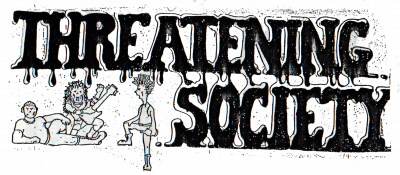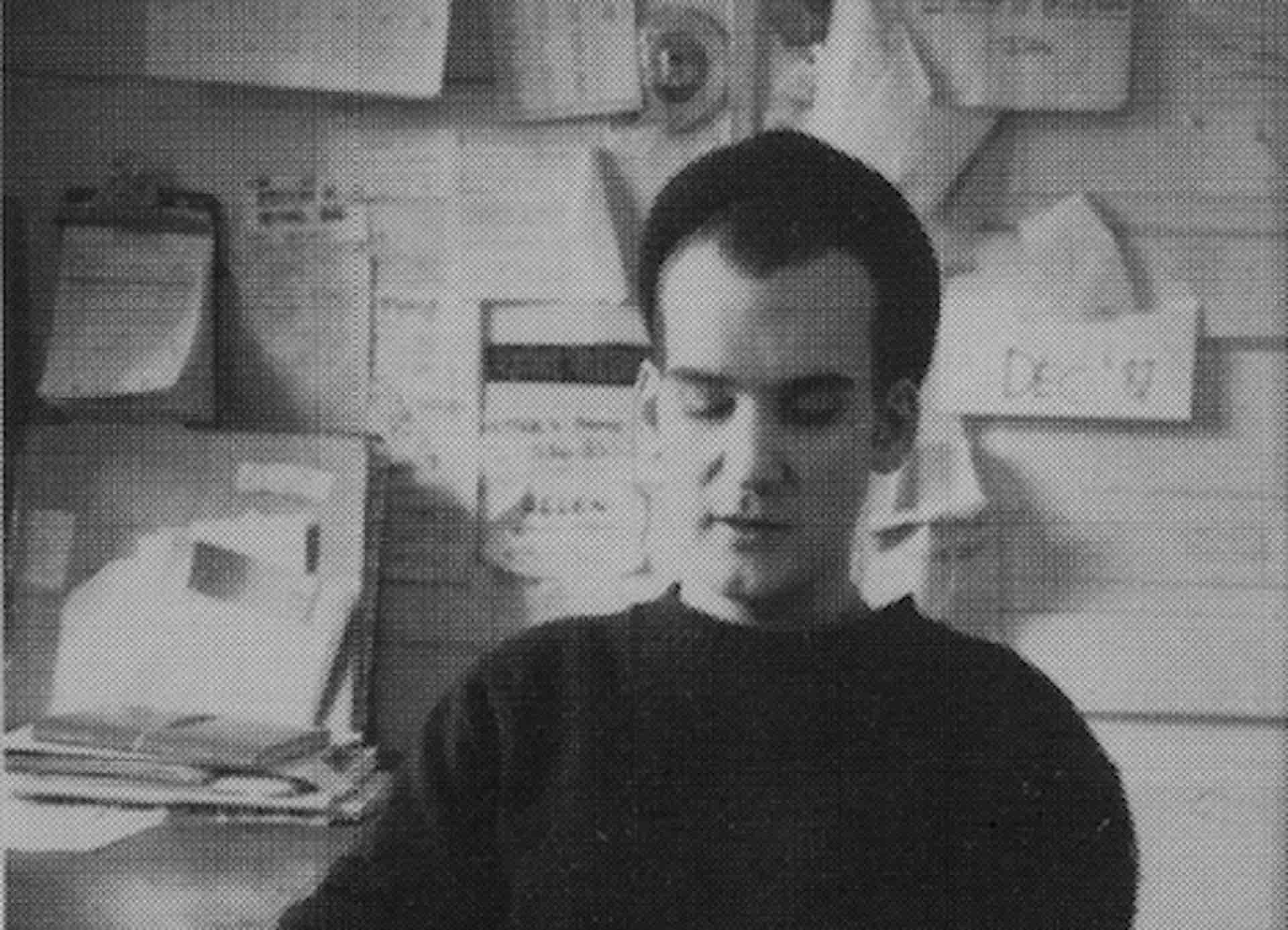[Originally published: Issue #6, circa 1989]
[LOOKING BACK: Hands DOWN Ian MacKaye is one righteous dude. He picked me up from the Metro station, drove me to the Dischord mansion, gave me a tour of his home, played with his dogs with me, and sat down for a few hours for an interview. I remember being a little starstruck by this whole experience, but genuinely touched. I mean, how many times have YOU been disappointed by meeting someone you admired, and have them actually be a jerkoff? I've met him a few times since (we put on a FUGAZI show here in Philly WAY back in the day), and he has always been a man of his word. -- Mickey]
How old are you now?
Twenty five.
How long have you been in the punk scene?
Um… The first time that I saw a punk band was in January of 1979. It was THE CRAMPS. The best show ever. The greatest show ever.
So there was no turning back then?
It was just tremendous. It was a very, very good show. Totally crazy. Then I saw THE CLASH about two weeks later. Then the BAD BRAINS and THE DAMNED in June of 1979. Totally great. Then, at that point, we were already in a band called THE SLINKEES. And Mark [Sullivan] who's in KINGFACE now, was singing. I played bass, Jeff [Nelson] played drums, a guy named Geordie [Grindle] played guitar. We played one show in the end of 1979, then Mark went to college. We got a new singer named Nathan [Strejcek] and formed TEEN IDLES.
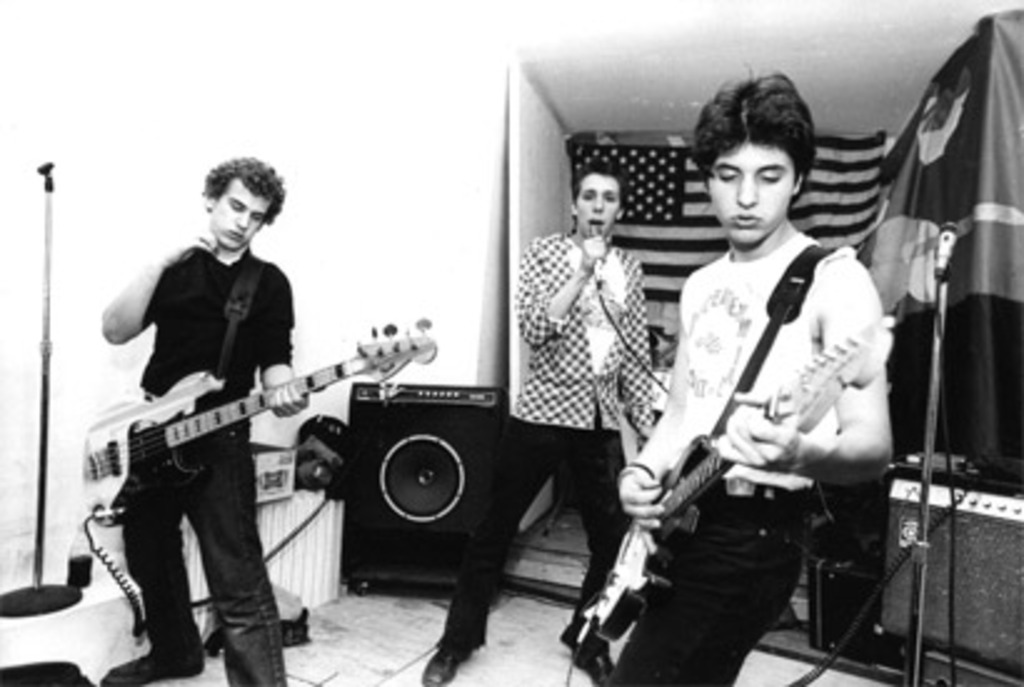
Did you take bass lessons?
No, I taught myself.
Was THE SLINKEES something you toyed around with?
Well, we were a real band. Like half of the TEEN IDLES songs were SLINKEES songs. "Deadhead" and a good amount of others. Well, we only played one time and that was at a party. But we definitely learned our instruments. Jeff never played drums before that band. I never played bass. But TEEN IDLES played their first show in December of 1979 and we broke up in November of 1980.
How popular would you say you were?
Well, you can't compare it to anything at the time. It was a totally different climate. There was no punk scene, really, whatsoever. It was comepletely different than it is today. There were no magazines or anything like that. It was a completely different situation. We had a strong following our shows tended to be about forty or fifty people. Our biggest show was about 1,200 people, but that was when we opened for THE CRAMPS.
Did you play outside of DC?
As a matter of fact, we played one show in Baltimore, one show in Norwalk, Virginia, one show in Los Angeles, and one show in San Francisco. That was sort of a fluke. In the summer of '80, we decided to go on a "tour." We got one show in San Francisco and one show in Los Angeles. We took our bass, our guitar, and our drumsticks, and got on a Greyhound bus. Mark and Henry [Rollins, formerly of BLACK FLAG] went with us. We went across the country and played the two shows. We saw the CIRCLE JERKS and the DEAD KENNEDYS for the first time. We were completely blown away by what was going on out there. It was so great. And then we came back, and sort of took it from there. And from that came MINOR THREAT.
Why did you break off to form MINOR THREAT?
Geordie quit. He wasn't happy with the way the band was going. We had different ideas. I think people got sick of it - sick of each other. We could've gotten another guitar player. At that point, I had written almost all the words, and I wanted to sing. At the same time, there was a band called THE EXTORTS in Washington. THE EXTORTS was SOA, except with Lyle [Preslar] singing. So they broke up at the same time we did, and Lyle wanted to play guitar. And I sang. Lyle knew Brian [Baker], and asked him if he wanted to play bass in the band. We played our first show in December of 1980.
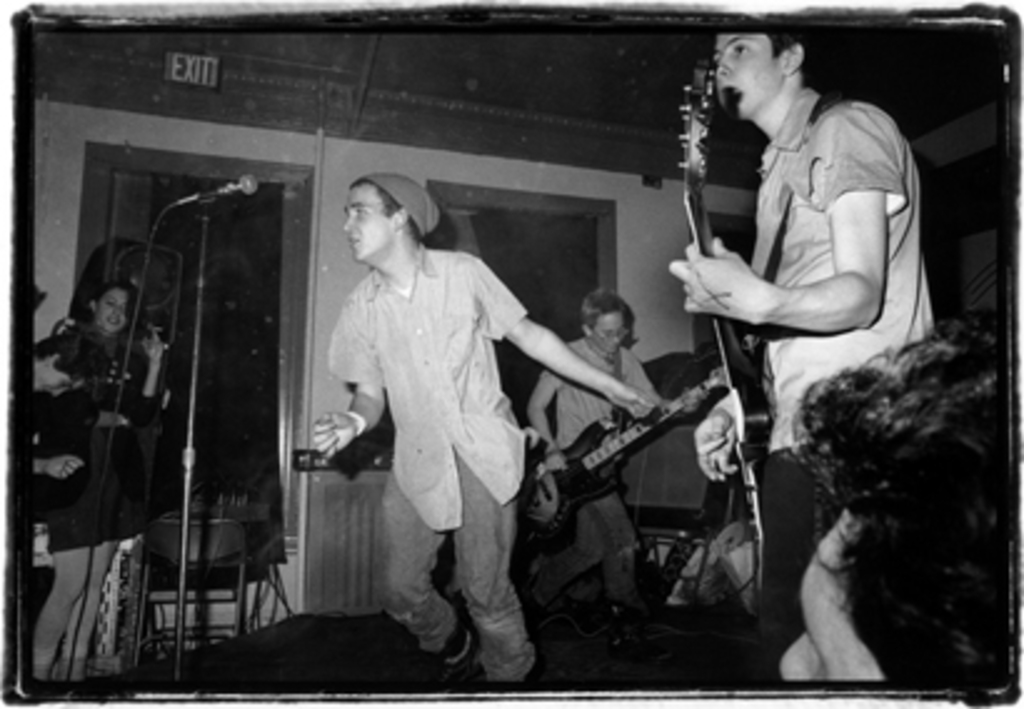
So you wrote all of MINOR THREAT's lyrics?
All except "Seeing Red," which was written by Jeff.
So, why did you break up? I mean you were probably one of the most popular bands. Even now… I went to a show a little while ago, and these 15-year-old kids were up there playing a MINOR THREAT cover…
Well, we had been together for three years, and we were starting to get very popular. We were starting to reach a point in the life of the band where our dreams were actually starting to come true! We could play anywhere we wanted, we had a lot of pull, we were able to do a lot of stuff. What was happening within the band was a lot of dissension about how the band should operate, and what the policies of the band should be, and what directions the band should go in.
So, it wasn't fun anymore?
Oh, it wasn't fun for a while. We argued eternally. We argued from day one. There was always an argument. There was always stuff to argue about. That was a part of the whole energy, I guess. We were charged, we were angry! One conflict is the Jeff and I own Dischord Records, and Lyle and Brian don't. So there's the problem, when the biggest band on Dischord is MINOR THREAT. And they might have wanted to sign to another label. Of course, Jeff and I weren't interested in that because we wanted to be on Dischord, our own label. Basically what happened was that we just came to a point where suddenly our aspirations and thins that we wanted to do came into play. We could actually consider "should we sign to a major label?", "Should we even attempt to?", or "Should we do this or that?" For me, personally, the answer is no. That's not what I want out of music. But for some people, yeah, they want to do something like that. That's the direction they want to go in. Obviously, we disagreed. It's not a matter of right or wrong. It's a difference of opinion. And in the end, instead of each of us compromising, continuing with the band, and making the name of the band suffer, we split, and pursued what we wanted on our own and let the band's name rest in peace. Let it stand for what it stood for. We broke up at a time, when you're right, we were completely popular. And it's just as we did. We didn't drag it out. And there are certainly a few bands that are still together today who, if they broke up four years ago, Christ, they would be legendary! But now they're sort of like a bad joke.
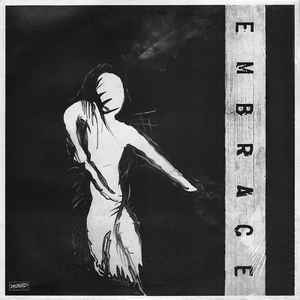
After MINOR THREAT, what band did you play in?
I messed around in a lot of different bands. I was never in a band, but I played with a lot of different people. I guess it was 1985, with EMBRACE.
How long did EMBRACE last?
We played our first show in September of 1985. We played our last show in February of 1986. You see, after MINOR THREAT broke up, Jeff and I were going to be in a band. I played bass, Mike Hampton played guitar, and Jeff drummed. And then, I played guitar, Chris Bald played bass, and drummed. And then, Chris Bald played bass, Mike Hampton played guitar, Jeff drummed, and I sang.
And then, Jeff left, and Ivor [Hanson], who used to be in FAITH, came. He was going to school at the time, and he practiced with us over Christmas break. We told him that we'd wait for him, so we waited until May or June of 1985. So, we had been playing a lot of these songs for a while. Basically, the band was together from summer of 1985 until the spring of 1986. It was a short lived band. There were a lot of problems with the band. It wasn't a forward moving band. There were a lot of personal problems. It was to be expected, because, I mean, the three of them Ivor, Mike, and Chris had been in FAITH for years, and it was just an unpleasant situation.
Did you write the lyrics for EMBRACE?
All except "Dance of Days," which Chris Bald wrote, I think.
It seems a lot more mature lyrically than MINOR THREAT. Was this intentional?
Maybe not intentional, but unavoidable.
I mean, the lyrics seem less angry.
Well, maybe it's a different type of anger, perhaps.
More contained?
Contained's not a fair word.
Less "Fuck You! Fuck You!"
Well, yeah. A big part of me has decided that there's not a whole lot of future in "Fuck you!" I'm not talking about a future in the career sense. Future in an answer sense.
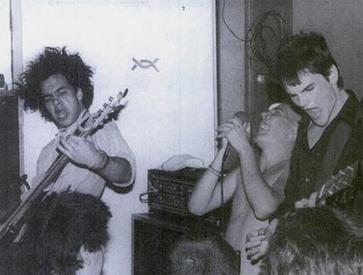
Punk rock, to me, has always been a search for answers, and the search for improvement. That's what it's always been to me: to correct thinks I see that are wrong - including myself. Most importantly, the stuff within myself. Of course, after a while I realized that the "Fuck You!" thing was just that - a "fuck you" thing. It didn't have any answers. Within EMBRACE, I certainly have cooled. For instance, I'm a pacifist. I won't fight. I won't fight anymore. It's a no-win situation. There's always more fighting to be done, and there's always someone who's bigger who will eventually kick your ass. Abd for me, it's much more important to try to communicate with people. With a band like EMBRACE, I'm just trying to put across these ideas. Bands to me have always been expressions of what I learn and of what I think is important. And my ideas are to put out to people, and they take these as they will. MINOR THREAT, to me, was a thoughtful band. It was the moment, the explosion, the anger. Totally legit. A lot of people think EMBRACE is way more angry than MINOR THREAT. "It's so negative, so angry!" they say. But people just read into it differently. Like you listen to it and say, "Well, it's not that angry," but someone said to me "I listened to that album and it made me want to kill myself!" To me, it's not that at all. It's totally about the search for the real life. In all of the bands that I've been involved in, I've always tried to find the core, the answer, the bottom line. It's a tough thing to find. The EMBRACE thing is closer - well, not closer, but it's on the road. From MINOR THREAT to EMBRACE, it's a progression. And hopefully, I'll continue to progress.
Do you concentrate more on lyrics then?
Music is very important. Lyrics always have a little more importance, only because the actual communication of an idea - the focus of an idea - will be based on that. Music, on the other hand, will always be very important, because it's the vehicle to grab people by the heart and make them listen. Share the message. Sometimes the music can be the message too. It's confusing.
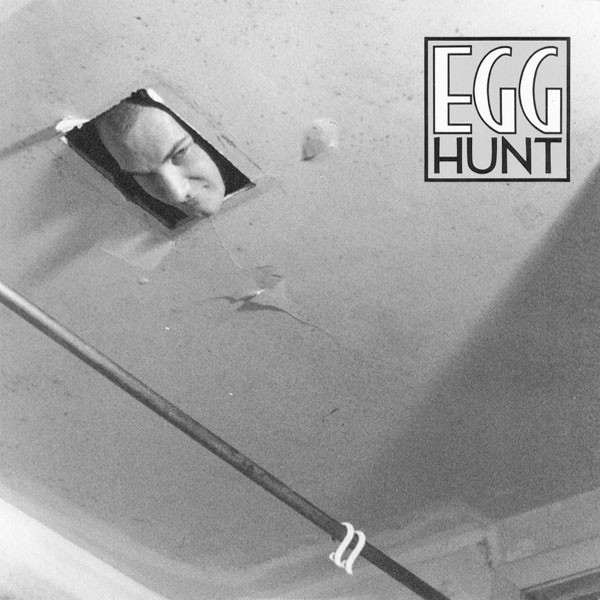
After EMBRACE, did you just experiment for a while?
I've always been involved in a lot of mess-around bands.
But EGGHUNT was next?
EGGHUNT really wasn't a band. It was more of a celebration of a friendship, I'd say. Jeff and I play very well together, but we can't be in the same band with each other.
You can't see that in the future?
No way. [laughter] We just can't deal with each other on a band level. We just disagreed completely.
How did it come about then?
We were in England, and a friend of ours had a studio and said, "Do you want to record?" We said, "Sure!"
Without any intention of releasing it?
IAN: No. We did it, and we liked it. It helps to own your own record company. I love the record.
Has it sold well?
Yes. About five or six thousand. Even if it didn't sell well, just to have it… I mean, it's got a nice sleeve…
Is the song "Me and You" about you and Jeff?
None of my songs are that particular. Sometimes a line might be about an individual, but it's about a lot of different things. "Me and You" is just about the whole world. You. Me. Everyone.
You played guitar on it. How did you learn?
No one taught me. Maybe I asked Lyle to show me a bar chord when I was in MINOR THREAT, or something. It was bound to happen. Keep in mind that I've been not only involved in my own bands, but I've produced just about every record here [referring to the many Dischord records covering the walls], and I've been surrounded by musicians. I played piano my whole life. I have a thing about music. I'm a musical person. The guitar is just another instrument to learn.
About your new band…
FUGAZI.
What does it mean?
It's a veteran slang term meaning screwed-up situation. I like the name because it's weird-looking and people always say, "What the hell does that mean?" They think it's some kind of oriental food or they think it's Italian. And most importantly, it's a name that doesn't presuppose. It's not like "Pain" or "Good." It's just FUGAZI, and you can take it as humor and as having a serious side to it. And it reflects sort of an overall view of the whole situation. We are in a messed-up situation.
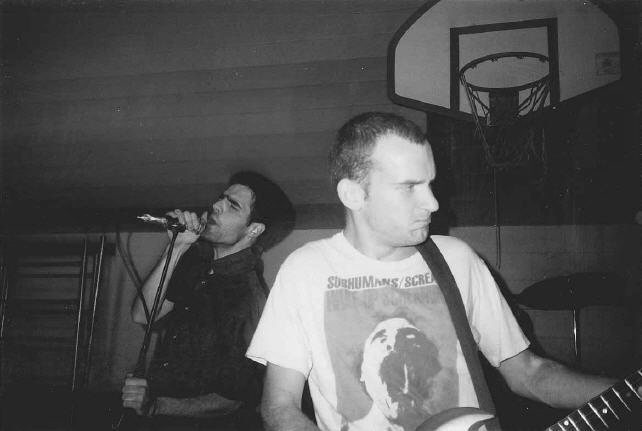
Do you reflect that in your lyrics?
I think that I've always reflected that in my lyrics.
But have they changed?
I'm still writing the words, and they're still about things I feel are important.
What's your line-up?
I'm playing guitar and singing. A fellow by the name of Joe [Lally] on bass, Brendan [Canty] from RITES OF SPRING on drums, and Guy [Piccioto] who was in RITES OF SPRING sings also, and sort of dances around and raises hell.
You've always been an energetic live performer. Has having to play guitar calmed you down?
Well, you're a little more stationary because you have to stand in front of a mic, instead of being able to move with the mic. But energy is not only movement. Energy is expression and strength in your performance. And there's plenty of time for me to move around if I want. Yeah, it's more restraining, but then again, there's more freedom, because I'm able to create sound with the guitar and shut the sound up, and I'm in more control of the sound. It gives me more freedom in that sense, where I'm not always at the beck and call of the guitar player. I'm more in charge.
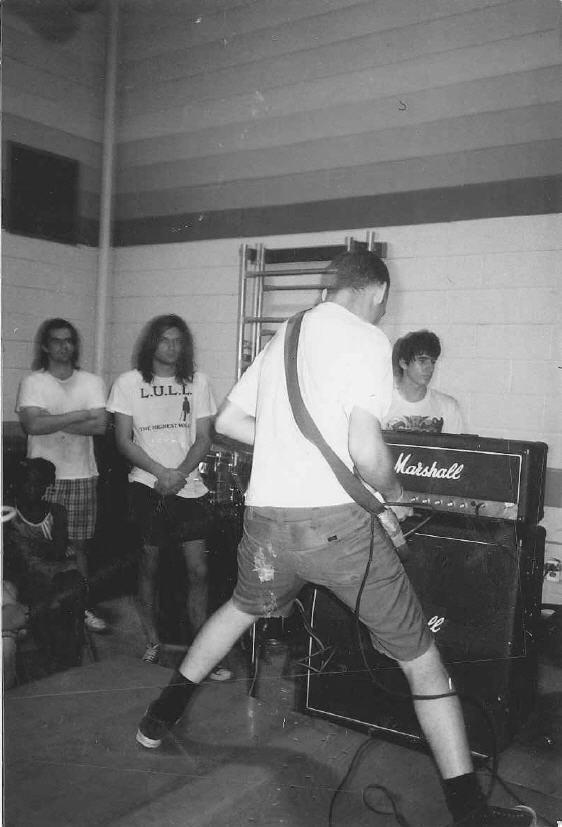
How many times has FUGAZI played out?
About ten times now.
Do you plan to release something?
I imagine eventually. Well, we're probably going to record in January, but currently, we're just playing live. We're still young. It's a young band. See, I have a strong belief in building and grass roots, in building your own foundation. You know, playing, really playing, to people, presenting new ideas, and really giving people the opportunity to hear you and think about the band, and not just "OK, here he is, Ian McKay I say "McKay" [pronounced mick-a] because my name is "MacKaye" [pronounced mick-i], and that's the difference between me and that other person. Ian McKay is my exploited alter-ego. "Here it is! Ian McKay's new band, FUGAZI! Ex-MINOR THREAT!" I don't care about that. The moment I undergo something like that is the moment that I say that the message isn't so important. The message is "come see me." And that's it.
And for me, it is more important to present something that people would want to see, and to present something that people would want to hear, and to think about. And I'd rather play to 20 people and have them say, "Wow! Right on!" than to a hundred thousand people saying, "Hey! Cool! MINOR THREAT!" I'm not in MINOR THREAT. We're trying to put across music that people don't have to slam to. We're trying to defeat that because we want everyone to come out and dance, particularly aimed at people who aren't the same. People talk about unity. But a lot of women are left out. Also, it leaves us with the idea that the only way to dance is to dance that way. I don't believe that. That's been the hardest part. The people are hung up on that kind of stuff. They like to slam. For us, it's important to present music that they didn't have to hurt each other to. It's not a cop-out. It's a cop-in.
Everyone seems to peg you with the foundation of the Straight-Edge movement. Did this start out as your own personal thing?
It's not a movement.
It seems to have become one.
Mainly because of things like, for instance - I'm not jumping down your throat or anything - but in a lot of your interviews, you ask bands, "Are you straight-edge?" And you create the movement. It's a personal decision. It's not an issue really. If it's important, they'll say it. You see, people forever now have been using it as a chip. Like the answer to the one question, "Are you straight-edge?" could completely change the entire interview. Someone might say, "No" and everyone might say, "Oh, these guys suck!" Well, yeah, I wrote the song "Straight Edge." I coined the phrase. Yes, I'm straight. I don't drink. I don't do dope, and I'm not down with a lot of stupid stuff. But at the same time, that's not the end. That's not the most important thing. That's not the point. The point is to get rid of distractions.
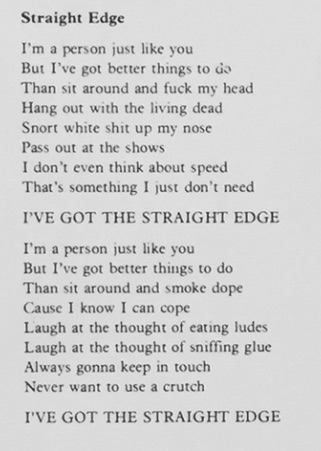
To me, when you make the Straight-Edge thing to be such a big deal, then that creates a distraction. A whole new distraction. People are not in search for communication. They're in search of kinship, like, "Oh, you're with me or you're not with me." It's one more team to be a part of.
Do you think it's gotten out of hand?
Of course, it got slightly out of hand. The moment that there's violence in the name of something, it's gotten out of hand. There's no movement more important than the human being. Period. The most important thing in the world is to be kind, good to other human beings and other life forms. The most important thing in the world is tolerance, and to not immediately jump to conclusions and not be full of hate. Because that's what the problem with the world is, that there's a lot of hatred, a lot of bad communication and misunderstandings. So for me, that's going to be way more important than what a person does or doesn't do. I'm surrounded by my dearest, dearest loved friends who drink… or smoke dope… or whatever. It's all around! But it's much more important for me to love those people, to be a part of them. Way more important than to say, "Screw you! If you're not with me, then I'm not with you!" That's the problem. I don't need enemies, man. I need friends.
But do you see an upsurge of straight-edge bands? What do you think of these new bands?
They're nice guys, but I don't know much about what goes on. Obviously, a lot of people call me up and say, "These guys are so screwed!" People will always talk bad about each other. The people I've met tend to be very nice. I have no problem with them.
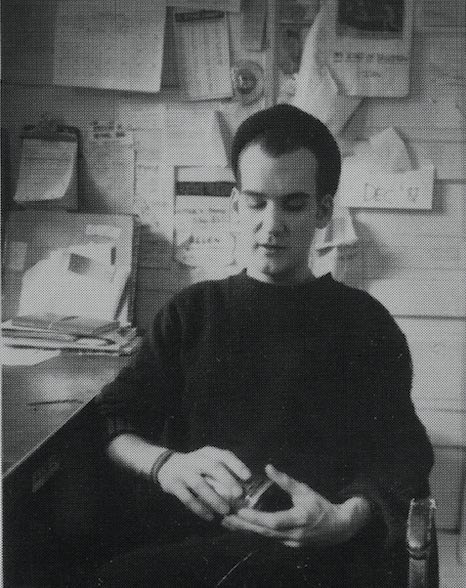
Is running Dischord Records your full-time job?
No, but it's certainly full-time. But I try to make money elsewhere. Dischord pays my rent and my bills. Food-wise, I do odd jobs. I work at a record store now and then. Also, like Thursday, I will be serving ice and drinks to DEPECHE MODE. I work as sort of a busboy, a hospitality kind of guy for big rock shows. Like BILLY IDOL, PIL, STEEL PULSE… very interesting. A lot of fun.
You like it?
Of course. I like everything. [laughter] It's very interesting to be in that part of the world. I have to get there first thing in the morning and serve their roadies all day. Go out and buy them shoelaces. Things like that. You learn a lot about rock and roll. I learned about things that I don't want to be a part of.
Do you enjoy running Dischord?
IAN: Hmmm… It's been very fun and it can still be very fun. I feel that it's still important to do. There are still some very important bands here, and there is still some important thought, important things to be a part of, and I'm happy about that. I don't like the more business aspects of it, because it sucks having to work within the confines of the business world. It sucks, man, particularly when you have to answer to other people's wills or what they want out of a business. It's hard, because we try to put something out very non-pretentiously or very non-slimy. Someone will slime it. They're going to put MINOR THREAT on an EMBRACE record. But you look at the album, and you'll see that we're trying very hard not to go for stuff like that, because we're trying to defeat that. We're trying to defeat the given "slime tactics." I think it's depressing. And sometimes it gets to be a drag. It is a business, and you can't escape it, which kind of sucks. It's even worse because of the fact that there is a conscience involved. We have a conscience, and we want to make sure we're doing the right things.
Which release sold the most copies?
The MINOR THREAT, obviously. I think that the "Out of Step" album has sold just over 50,000, and the number 12 [the 12" LP with two MINOR THREAT 7" EPs] is just under 50,000. These figures include cassettes.
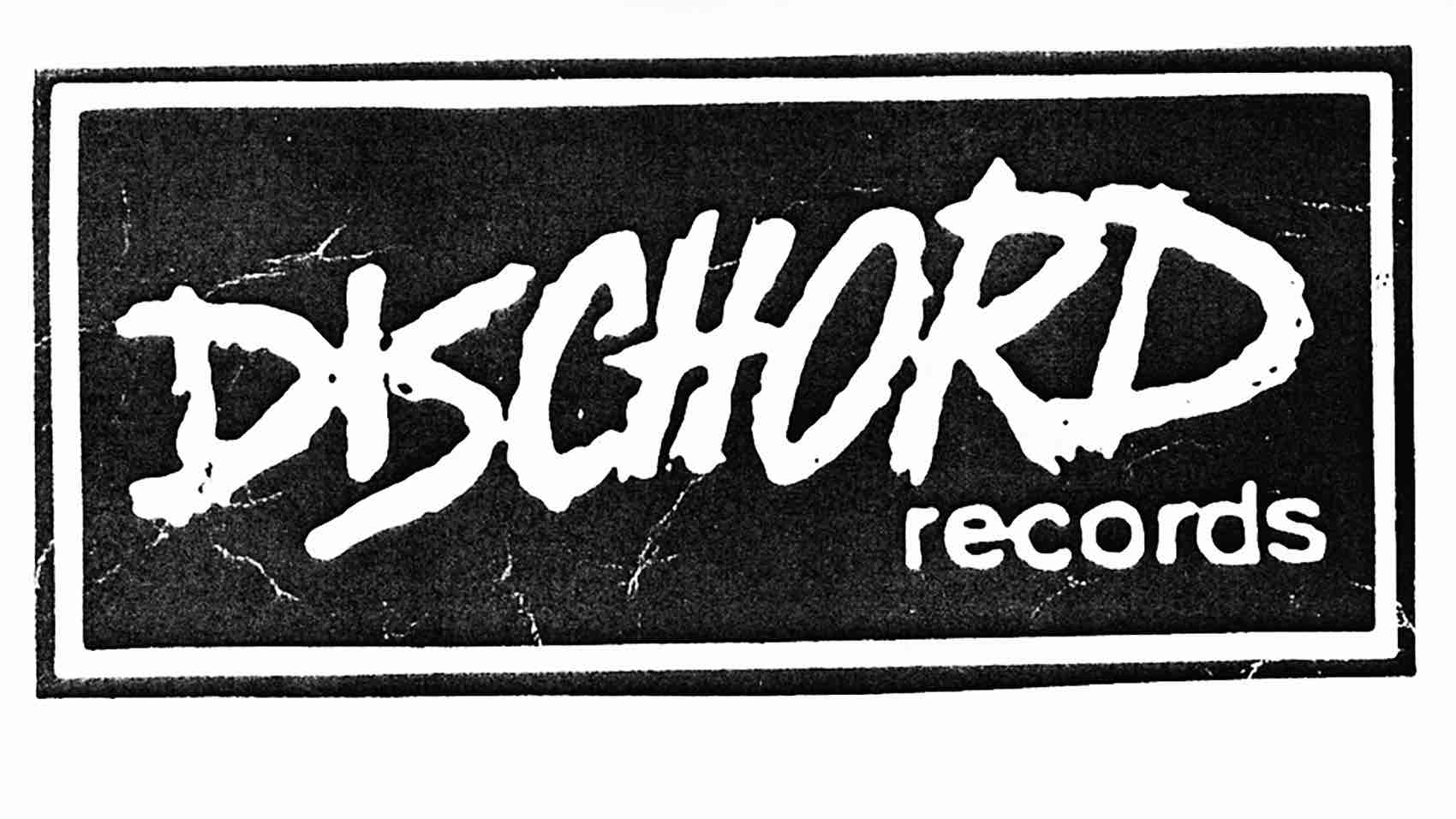
Are you thinking about releasing a MINOR THREAT video?
[laughter] Well, there's a live video of us that I think is pretty good, and Jeff has wanted to release it for a long, long time. It's been ready for release for quite a while, but Jeff has been working on artwork, and he's trying to make a nice booklet to go in it with pictures and lyrics. He's been really, really busy with school, and it's just taking him a really long time to get it done. We were hoping to get it done by Christmas this year, but as you can see, it didn't happen. Hopefully, it will be out in the early spring, which kind of sucks because, definitely, we've been planning for it to be out for the last six months. We just haven't been able to get it out yet.
Do you ever find yourself wanting to drop it all and get a "normal" job?
Of course! But only because that's not what I'm doing. If I was doing that, I'd thing, "Gee, I'd love to have the label back." Have you thought, "Gee, what if I didn't go to school in Baltimore?" Of course I'll think about it. I always think about everything, I'm always wondering about, like, "What if I decided not to sing in the band and just play guitar?" or whatever, I always think about "what ifs." I think I'll have plenty of opportunity not to have Dischord in the future. I know Dischord will not be a forever thing. But having it has been totally great.
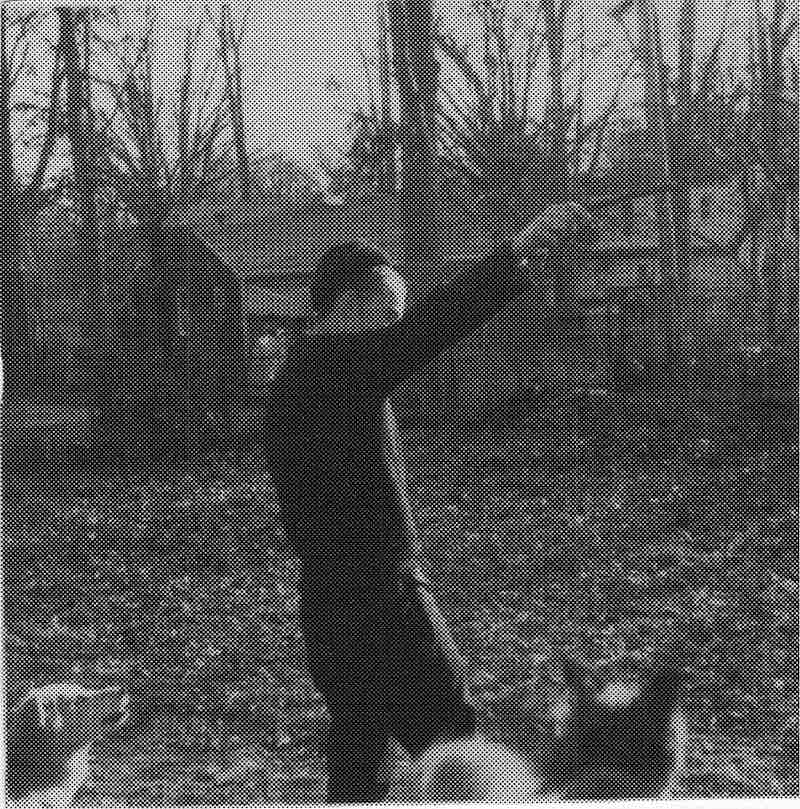
[Mark Sullivan of KINGFACE stops in to say goodbye before he leaves for dinner at his grandmother's house.]
MARK SULLIVAN: I know that this is Ian's interview, but for the record, I'd like to say that Christmas is a little pain in the ass. It's nice that everyone gets to come home and be together and the family thing is OK, but this gift thing…
IAN: Consumer borgeois bullshit.
MARK: Because I have to think of something for my grandmother to get me, otherwise, she'll be sad.
[laughter, non-stop, as Mark departs]
IAN: Anyway, having Dischord has totally been great, and to meet as many people as I have met, and to be as involved with many great people and as many good movements and good things that are happening. And it's given me… Shit, man. Look at me. What have I done? I've never gone to school. But I've learned a million things. School isn't the only place you can learn things. I never thought I'd go to school, so it kind of works itself out. Certainly, I'm a failure in some senses, I guess to people who attach some sort of importance to wealth and success. To them, I'm a failure. But I don't give a fuck. I'm happy. To me, there are two ways you can look at life. You can say, "Jeez! I need to have more money to live. I'm poor! I'm poor!" and be bummed. Or you can be at the same level and say, "I don't need all of this luxury stuff, and I'll just cut corners and be happy." I don't spend that much money. I live cheaply. The ways that I can do that are not going out and buying things, being a good consumer, not worrying about fashion, not purchasing new clothes all of the time or paying a lot of money for a leather jacket or something like that. You can avoid it by what you eat. You know, first off, I don't ever go to a fast-food place. It's obviously a rip-off. And to top that, being a vegetarian, you're in a situation where you spend even less money. I spend no money. Food is cheap, and the simpler that you make your life, the less expensive it is. It's no problem. You get more enjoyment out of smaller things. It works itself out. But if you need to live a grandiose life, if you need to have a VCR, a CD player, if you have to go out to have a good time… I mean, alcohol costs a hell of a lot of money. Like [Jello] Biafra [of the DEAD KENNEDYS] once said, "People always question why I have so many records. It's because I didn't spend all of my money on drugs." It's a fair point. And since I don't spend my money on anything, I'm fine. It'll be OK for a while. It's a simpler approach to life. It's not one that's too popular in the 80s though. People are very possession-oriented now. They tend to be very success-bound. It's so important to be rich, but it will do you no good, if people hate you.
I guess this could bring us back to the whole "selling-out" thing. A lot of bands have changed their sounds and their message to make them more mainstream. Do you think that they're compromising their ideals?
I don't know if they're compromising their ideals. Maybe that's just what they want to do. I mean, everyone compromises their principles. Anytime you're in a band with more than one person you have to compromise your principles to some degree. You can't do things exactly as you want to do it. As soon as you want to play a club, for instance, you compromise your principles to some degree. Look at me. I find the alcohol industry to be a really horrible, horrible thing, and yet I find myself playing at functions where alcohol is not only served, but is sometimes the basis for the venue! The club itself is centered on the sale of alcohol. So, in my own little way, I guess I'm promoting it. That's a drag. That's a compromise, but I weigh it against the fact that I don't play shows that aren't all ages, no matter what. But when I speak out, hopefully it makes people think. And maybe by reaching these people we can move it out of that arena and into one where you don't have to have the alcohol present at all times. That's an example of a compromise. It's a compromise that I understand and accept. And as long as all humans are admitted to the place, I'll play it. It's got to be a cheap door price too, to make it accessible to the kids.
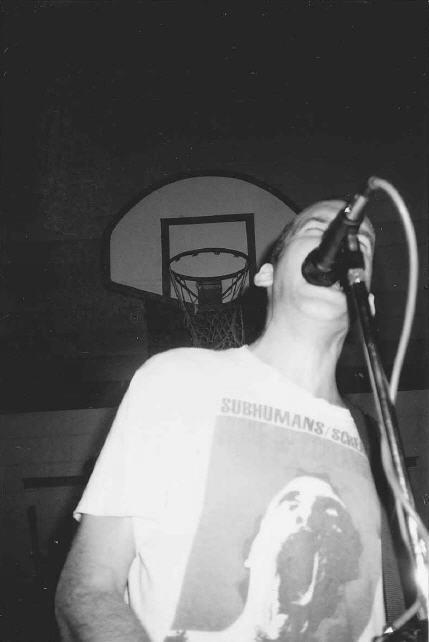
What do your parents think about the path you've chosen?
They think it's great.
Are they supportive?
IAN: Sure. As a matter of fact, I spent the evening with them last night. I see them all the time. That's one of the advantages of getting your mail at your mom's house. They're very supportive. They dig it.
What do you think is wrong with the world?
IAN: The problem with the world, for me at least, is that people completely play a part in a situation that's hurting a lot of other human beings. For instance, with vegetarianism, of course I'm bothered by something. That's part of the whole trip, because people don't think about what's going on. They think about themselves. People have a very self-centered way of looking at things. They're very concerned about, "Oh, it's so inconvenient to have to make your own food," or, "It's inconvenient to not have a nice car." These are the problems that I see with the world. I don't find things like, "Oh, well these guys did this," or, "They didn't do that." Who cares what they did? This is a tiny little microcosm of a community this punk scene. It's insignificant.
But now you're willing to talk it out instead of fighting.
I've always been willing to talk it out. The fighting thing was a concept. An idea. I had this whole idea that I'd be able to fight people without injuring them. Just to bruise their ego. It was this great idea that I had. What happened was that it never ended. The fighting continues on and on and on. People were always fighting. And then a new breed of people came, and they were fighting. And they always say, "Well, you used to fight." And they're right. I used to fight. Then one day I realize the only answer was for me not to fight anymore, because violence is the end. Pain hurts, and that's one thing we all agree on, and no one should suffer in life. And when people hurt you, they're out of line. I might defend myself. I don't know. For three years or so no, I haven't fought. I don't do it.
Do you see more fighting now?
IAN: I see a lot more people acting tough, but I saw way more fights in the early days. I'm sure that there's a lot of violence, but I haven't seen as much. I don't see bands that promote violence, and that may be one of the reasons. There's a lot more thuggery. Intimidation, extortion, stealing… gutter shit like that. It's important to look at these people as individuals, too. Try to communicate with them.
